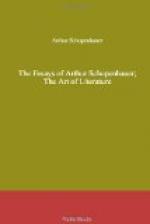So even Shakespeare’s dramas had, immediately after his death, to give place to those of Ben Jonson, Massinger, Beaumont and Fletcher, and to yield the supremacy for a hundred years. So Kant’s serious philosophy was crowded out by the nonsense of Fichte, Schelling, Jacobi, Hegel. And even in a sphere accessible to all, we have seen unworthy imitators quickly diverting public attention from the incomparable Walter Scott. For, say what you will, the public has no sense for excellence, and therefore no notion how very rare it is to find men really capable of doing anything great in poetry, philosophy, or art, or that their works are alone worthy of exclusive attention. The dabblers, whether in verse or in any other high sphere, should be every day unsparingly reminded that neither gods, nor men, nor booksellers have pardoned their mediocrity:
mediocribus
esse poetis
Non homines, non Di, non concessere columnae.[1]
[Footnote 1: Horace, Ars Poetica, 372.]
Are they not the weeds that prevent the corn coming up, so that they may cover all the ground themselves? And then there happens that which has been well and freshly described by the lamented Feuchtersleben,[1] who died so young: how people cry out in their haste that nothing is being done, while all the while great work is quietly growing to maturity; and then, when it appears, it is not seen or heard in the clamor, but goes its way silently, in modest grief:
“Ist doch”—rufen sie vermessen— Nichts im Werke, nichts gethan!” Und das Grosse, reift indessen Still heran.
Es ersheint nun: niemand sieht es, Niemand hoert es im Geschrei Mit bescheid’ner Trauer zieht es Still vorbei.
[Footnote 1: Translator’s Note.—Ernst Freiherr von Feuchtersleben (1806-49), an Austrian physician, philosopher, and poet, and a specialist in medical psychology. The best known of his songs is that beginning “Es ist bestimmt in Gottes Rath” to which Mendelssohn composed one of his finest melodies.]
This lamentable death of the critical faculty is not less obvious in the case of science, as is shown by the tenacious life of false and disproved theories. If they are once accepted, they may go on bidding defiance to truth for fifty or even a hundred years and more, as stable as an iron pier in the midst of the waves. The Ptolemaic system was still held a century after Copernicus had promulgated his theory. Bacon, Descartes and Locke made their way extremely slowly and only after a long time; as the reader may see by d’Alembert’s celebrated Preface to the Encyclopedia. Newton was not more successful; and this is sufficiently proved by the bitterness and contempt with which Leibnitz attacked his theory of gravitation in the controversy with Clarke.[1] Although Newton lived for almost forty years after the appearance of the Principia, his




